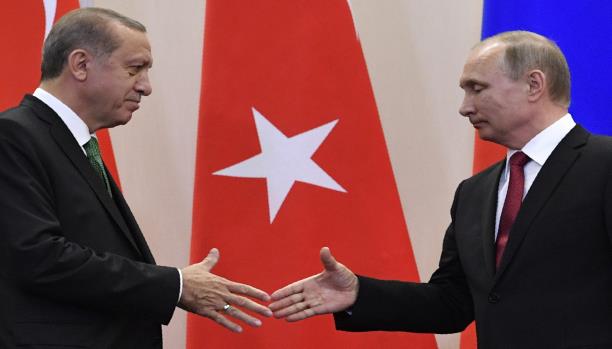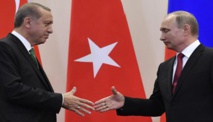Speaking at a joint news conference in Sochi Putin insisted regime ally Moscow and rebel backer Ankara wanted to bolster a tattered ceasefire in Syria and that establishing safe zones should help.
"We both proceed on the basis that -- and this is our common position -- the creation of safe zones should lead to further pacification and cessation of hostilities," Putin said.
An Arabic-language version of the Russian proposal seen by AFP calls for the creation of "de-escalation zones" in rebel-held territory in the northwestern province of Idlib, in parts of Homs province in the centre, in the south, and in the opposition enclave of Eastern Ghouta near Damascus.
The aim is to "put an immediate end to the violence" and "provide the conditions for the safe, voluntary return of refugees" as well as the immediate delivery of relief supplies and medical aid, the document said.
Putin said that the proposed zones would also be no-fly areas if fighting on the ground there stopped entirely.
Erdogan, however, appeared more muted on the Russian proposals, avoiding a direct reference to them as he spoke vaguely only of a de-escalation zone in Idlib province.
The two leaders have supported opposing sides in the Syrian conflict but their positions have drawn closer as they have patched up differences over Ankara's downing of a Russian jet in 2015 at a string of meetings.
- Rebel walkout -
The new proposal by Russia is the latest attempt by key powerbroker Moscow to breathe life into stalled peace negotiations after its military might turned the conflict in favour of leader Bashar al-Assad.
The Kremlin's plan echoes calls by US leader Donald Trump to establish safe zones in Syria and Putin said "as far I could tell" the US leader broadly supported the idea in a phone call they held on Tuesday.
The Russian strongman said that any agreement on the initiative would have to be hammered out by representatives from Damascus and the opposition currently meeting in the Kazakh capital of Astana.
The Kremlin envoy at the Astana talks, Alexander Lavrentiev, said the initiative was meant to "help significantly reduce the level of armed confrontation between the Syrian armed opposition and government forces."
But issues including which countries could police any safe zones remained major hurdles and there was no sign the warring sides were in any mood to start doing deals.
Instead the opposition said it was halting its participation as the fourth round of talks sponsored by Assad allies Russia and Iran and rebel supporter Turkey began.
"The rebel delegation is suspending the meetings because of the violent air strikes on civilians. The suspension will continue until shelling stops across all Syria," a rebel source in Astana told AFP.
The delegation met later with a US observer mission at the talks and spoke to the United Nations Syria mediator Staffan de Mistura but insisted they were sticking to their decision to withdraw.
The Astana talks are portrayed as a complement to broader UN-backed peace efforts in Switzerland that have so far failed to bridge major rifts between the warring sides.
Before they began, the rebel side laid out a list of demands including a regime withdrawal from areas taken after the start of a tattered ceasefire at the end of last year that the opposition accuses Damascus of frequently violating.
The Syrian Observatory for Human Rights monitor meanwhile said a car bomb on Wednesday killed at least five people in the rebel-held town of Azaz near the Turkish border.
The blast followed a bloody jihadist assault on Tuesday by the Islamic State group against a camp for displaced people on the border with Iraq that left at least 46 people dead.
-----------------------------------------------------------------------------------------------------------------------------
"We both proceed on the basis that -- and this is our common position -- the creation of safe zones should lead to further pacification and cessation of hostilities," Putin said.
An Arabic-language version of the Russian proposal seen by AFP calls for the creation of "de-escalation zones" in rebel-held territory in the northwestern province of Idlib, in parts of Homs province in the centre, in the south, and in the opposition enclave of Eastern Ghouta near Damascus.
The aim is to "put an immediate end to the violence" and "provide the conditions for the safe, voluntary return of refugees" as well as the immediate delivery of relief supplies and medical aid, the document said.
Putin said that the proposed zones would also be no-fly areas if fighting on the ground there stopped entirely.
Erdogan, however, appeared more muted on the Russian proposals, avoiding a direct reference to them as he spoke vaguely only of a de-escalation zone in Idlib province.
The two leaders have supported opposing sides in the Syrian conflict but their positions have drawn closer as they have patched up differences over Ankara's downing of a Russian jet in 2015 at a string of meetings.
- Rebel walkout -
The new proposal by Russia is the latest attempt by key powerbroker Moscow to breathe life into stalled peace negotiations after its military might turned the conflict in favour of leader Bashar al-Assad.
The Kremlin's plan echoes calls by US leader Donald Trump to establish safe zones in Syria and Putin said "as far I could tell" the US leader broadly supported the idea in a phone call they held on Tuesday.
The Russian strongman said that any agreement on the initiative would have to be hammered out by representatives from Damascus and the opposition currently meeting in the Kazakh capital of Astana.
The Kremlin envoy at the Astana talks, Alexander Lavrentiev, said the initiative was meant to "help significantly reduce the level of armed confrontation between the Syrian armed opposition and government forces."
But issues including which countries could police any safe zones remained major hurdles and there was no sign the warring sides were in any mood to start doing deals.
Instead the opposition said it was halting its participation as the fourth round of talks sponsored by Assad allies Russia and Iran and rebel supporter Turkey began.
"The rebel delegation is suspending the meetings because of the violent air strikes on civilians. The suspension will continue until shelling stops across all Syria," a rebel source in Astana told AFP.
The delegation met later with a US observer mission at the talks and spoke to the United Nations Syria mediator Staffan de Mistura but insisted they were sticking to their decision to withdraw.
The Astana talks are portrayed as a complement to broader UN-backed peace efforts in Switzerland that have so far failed to bridge major rifts between the warring sides.
Before they began, the rebel side laid out a list of demands including a regime withdrawal from areas taken after the start of a tattered ceasefire at the end of last year that the opposition accuses Damascus of frequently violating.
The Syrian Observatory for Human Rights monitor meanwhile said a car bomb on Wednesday killed at least five people in the rebel-held town of Azaz near the Turkish border.
The blast followed a bloody jihadist assault on Tuesday by the Islamic State group against a camp for displaced people on the border with Iraq that left at least 46 people dead.
-----------------------------------------------------------------------------------------------------------------------------









 Home
Home Politics
Politics











